1. The first castaway – marooned on 29 January 1942 – was Vic Oliver, a music-hall star in the 1930s. He was the perfect first interviewee for presenter Roy Plomley, the Wodehousian wannabe actor who devised the show. The first guest was supposed to be the philosopher CEM Joad, but he was indisposed. Who knows how broadcasting history would have turned out if Joad had made it to the recording.
2. The second castaway, on 5 February 1942, was the critic James Agate. Incestuously, one of his musical choices was Eric Coates’s By the Sleepy Lagoon, the programme’s theme music (which was inspired not by a tropical island, but by Bognor Regis). Agate was gay, but Plomley would never have dreamed of discussing such subjects – either in 1942 or 40 years later, when he was still presenting the show.
3. Comedian Arthur Askey, clearly a favourite of Plomley’s, made the first of his record four appearances on 2 April 1942 – the others came in 1955, 1968 and 1980, two years before his death. He shares the record – and maybe the records – with David Attenborough.
4. Bizarrely, Roy Plomley himself was one of the earliest subjects – perhaps CEM Joad had again failed to show. Plomley was interviewed by the BBC’s head of music Leslie Perowne in May 1942, and chose lots of Borodin. (Plomley made another appearance as castaway in May 1958, on this occasion interviewed by Eamonn Andrews.) The key thing to remember about these early episodes is that they were music shows, with very little probing of the castaway’s life. It became a little more searching later under Plomley, and his successors – Michael Parkinson, Sue Lawley and Kirsty Young – then brought greater journalistic nous to it.
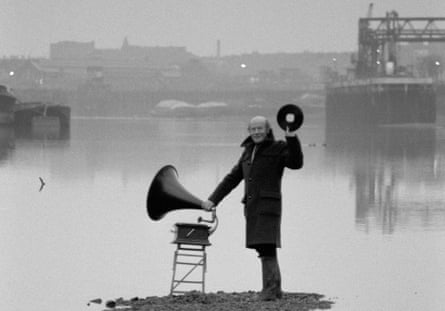
5. The problem with the early Desert Island Discs is that the programmes weren’t kept, and very few early episodes are available. One of the many missing interviews is with the great film director Michael Powell, who was cast away on 24 October 1942. Powell appeared again, alongside his film-making partner Emeric Pressburger, in September 1980.
6. On 20 October 1945, CEM Joad finally made it on to the island. His musical tastes were singularly canonical – Bach, Mozart, Beethoven, Schubert. Plomley had always advocated a wide range of guests – “dance-band leaders, actors, members of the Brains Trust, film stars, writers, child prodigies, ballet dancers and all sorts of people could be included,” he wrote in his initial submission to the BBC – but Vic Oliver and Arthur Askey were probably more fun.
7. The programme was dropped as part of a postwar shakeup at the BBC in 1946, but was revived in 1951 and has been going strong ever since. The first guest in the new run – on 3 January 1951 – was actor Eric Portman.
8. The singer Gracie Fields was cast away in June 1951. Plomley warns her that the island will be “quite deserted, nobody about, no warmth, no comfort”. “It sounds like some of the places I used to play on tour,” she tells him.
9. Asking guests to choose a luxury only began on 16 September 1951, when the actor Sally Ann Howes modestly requested garlic – this was still the era of rationing, remember.
10. In this wildly innovative period, the tradition of giving castaways a copy of the Bible and the complete works of Shakespeare and asking them to choose another book started a month later. The first chooser was Henry Kendall – one of Plomley’s limitless list of actors with a talent for revue. Kendall chose Who’s Who in the Theatre, underlining how rooted the Desert Island Discs of the 1950s was in the world of the West End.
11. The singer and comedian George Formby appeared in November 1951. He chose his trademark instrument, the ukulele, as his luxury. But not just any old ukulele. “I’d take the first one I ever had – the one I serenaded Beryl [his wife] with when we were courting, the one I taught myself to play on first of all. It would keep my spirits up, and I might even be able to find a monkey who liked listening to it.”
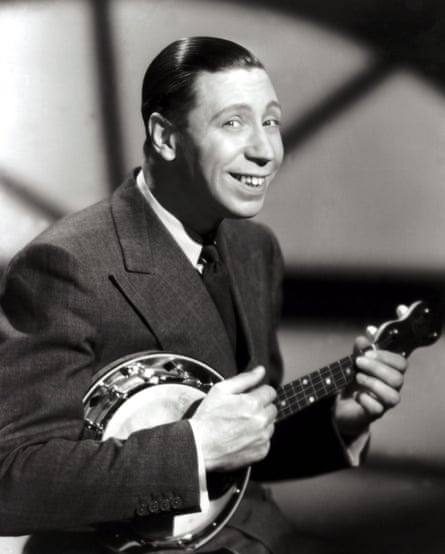
12. John Betjeman made the first of two appearances in October 1954. His luxury was the lower half of the west window of St Mary’s church in Fairford, Gloucestershire. His less churchy choice when he returned, in April 1975, was champagne.
13. Singer, comedian and star of the Goon Show Harry Secombe made of the first of his two appearances in September 1956 and chose one of the great luxuries – “a collapsible concrete model of Broadcasting House with plastic announcers”, so he could imagine his colleagues “working their nuts off” while he was sunbathing.
14. The German soprano Elisabeth Schwarzkopf’s appearance on 28 July 1958 became notorious because seven of the eight discs she chose featured one E Schwarzkopf as soloist.
15. Schwarzkopf’s solipsism is outdone only by the pianist Moura Lympany, who in July 1979 chose all her own recordings.
16. Alfred Hitchcock was cast away on 19 October 1959. Just seven and a half minutes of the interview survive. Plomley asks if he is working on a new film. “I’m planning a psychological film,” replies Hitchcock in that unforgettably slow, mournful voice. “It’s called Psycho. It’s in the nature, shall we say, of a rather gentle horror picture.”
17. The castaway on 23 May 1960 was the glitzy pianist Liberace – or “Mr Liberace”, as Plomley insists on calling him – who was then at the height of his fame. Liberace tells Plomley he looks forward to being on the island because he won’t have to wear his trademark lavish outfits. Naturally, his luxury of choice was a piano – without the candelabra.
18. In 1964 the herring gulls that accompany the opening music were replaced after listeners pointed out they were indigenous to the northern hemisphere and would not have been found on the shores of a tropical island. The sounds of tropical birds were substituted, but even more listeners complained, so after a couple of months the geographically inappropriate gulls returned.
19. One of the truly great encounters was broadcast on 4 January 1965 when Plomley interviewed a breathy Marlene Dietrich in her dressing room at a West End theatre. “Is there anything in the situation of a desert island that you’d be particularly frightened of,” Plomley asks her. “No, no, no, I’m frightened of nothing,” says Dietrich. And you believe her.
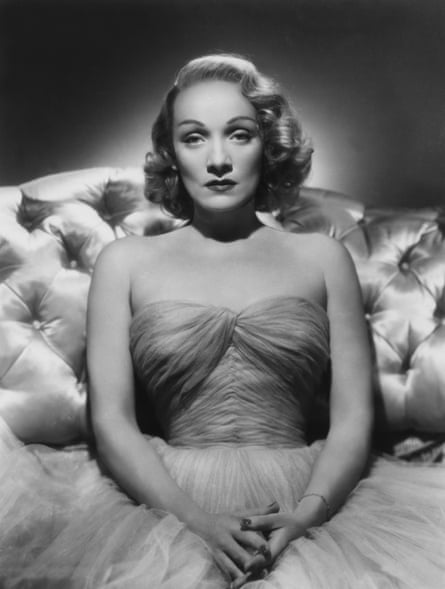
20. Alan Bennett was cast away on 28 August 1967. His luxury was an “unending supply of afternoon teas”. He has never returned. “It’s years since I was on Desert Island Discs,” he wrote in his diary in 2010, “but these days I’d find it much easier to choose the eight records I don’t want than those that I do. I don’t ever want to hear again Mussorgsky’s Pictures at an Exhibition, Rimsky-Korsakov’s Scheherazade, Schubert’s 5th Symphony, Beethoven’s Pastoral Symphony, Mozart’s 40th Symphony.”
21. Louis Armstrong, who Plomley addresses as “Satch” (short for Satchmo, Armstrong’s nickname), was cast away in August 1968. He chooses mainly his own records – Blueberry Hill, Mack the Knife, What a Wonderful World – but you forgive him. The king of jazz died three years later, and this programme – only discovered and added to the archive last year – is a wonderful memorial.

22. For the 1,000th Desert Island Discs on 20 December 1969, the castaway was Bernard Montgomery – “Monty”, the famed field marshal who had been made Viscount Montgomery of Alamein after his triumphs in the second world war. Past 80 by the time of the interview, he is gloriously clipped and military – Plomley feels obliged to call him “Sir”. The army had been his life, he had found retirement difficult, and you sense that in his musical choices, which are filled with yearning – My Love Is Like A Red, Red Rose, You Are My Heart’s Delight, O For the Wings of a Dove.
23. In February 1971 Plomley interviewed the blunt-speaking Yorkshire-born showjumper Harvey Smith. He refused to take a book to the island, saying he’d never read one in his life.
24. In the first of his two appearances, in July 1971, the comic writer and actor John Cleese chose a “life-sized model of Margaret Thatcher and a baseball bat”. On his second appearance, in January 1997, Cleese chose Michael Palin – as long as he was stuffed.
25. The rumbustious Oliver Reed was cast away in November 1974. All that remains is a six-minute segment, which sadly doesn’t include Reed’s infamous luxury – a blow-up doll.
26. The greatest programme never broadcast was Plomley’s interview with Alistair MacLean in the 1970s. He thought he’d finally bagged the elusive thriller writer, but they’d booked the wrong Alistair MacLean – this one was head of Ontario’s European tourist bureau. Plomley quickly realised the error, but gamely carried on with the interview. It never made it on air.
27. The castaway on 21 May 1977, PL Travers (creator of Mary Poppins), managed not to choose any music at all, opting for recitations of seven poems and one speech from Shakespeare. “If you put me on a desert island,” she explained, “I would want above all things to hear the human voice.”
28. In February 1978 Plomley interviewed the comic genius Spike Milligan, who had also been on in 1956 at the height of Goon-mania. He chose a Barclaycard as his luxury, saying that “while I’m there I’m saving money”.
29. Two weeks later, Plomley’s guest was Margaret Thatcher, who was then leader of the opposition. Plomley, as ever, is obsessed by the island rather than political philosophy – did you ever go camping, would you try to escape etc? We helpfully learn that the soon-to-be-prime-minister didn’t have much experience of camping.
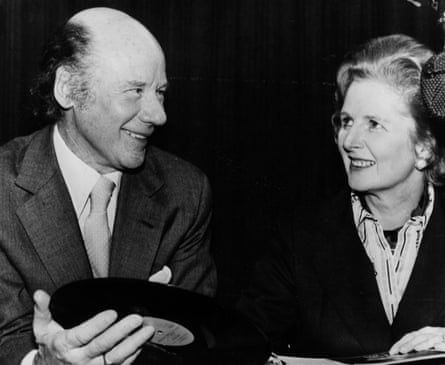
30. Les Dawson, in April 1978, was another great comic guest. There are some excellent one-liners – “The neighbours loved it when I played the piano, they used to break the windows so they could hear me better” – but seriousness too. “To be a comedian is to be lonely,” he tells Plomley in reply to the usual opening gambit: “How would you cope on a desert island?” Dawson’s choice of discs encompasses Chopin, Ravel, Edith Piaf and WC Fields.
31. In September 1978 Plomley interviewed the American playwright Tennessee Williams. There is no discussion of his homosexuality or drink and drug dependence, but Plomley does touch on his depression and on his beloved sister Rose’s schizophrenia.
32. In March 1979 Plomley faced the magisterial Lauren Bacall. She is not pleased when he asks her which of her eight records she would keep if seven were washed away. “That’s a dirty trick,” she tells him. “Thank you for letting us hear your desert island discs,” the affable Plomley says as the programme ends. “And thank YOU,” Bacall replied, “for taking seven of them away from me.”
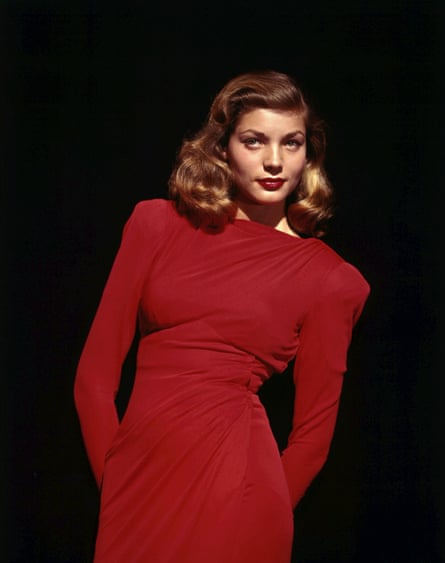
33. The castaway on 15 December 1979 was another legend, the American writer Norman Mailer. He chose “a stick of the best marijuana” as his luxury. “This is illegal talk, Mr Mailer,” says Plomley sternly.
34. In February 1980 poor Plomley faced the dyspeptic director Otto Preminger. “Could you look after yourself on the island,” Plomley asks him. “Could you build a hut?” “Build a HUT?,” says Preminger incredulously. “You must be out of your mind. Can YOU build a hut?” Preminger chooses scores from his films to accompany him on the island and his autobiography as his book. Plomley sounds frazzled by the end.
35. In January 1981 the castaway was Princess Margaret. Plomley, who sounds especially unctuous, addresses her as ma’am. She is fantastically posh, chooses Rule Britannia as one of her discs, and asks for Scotland the Brave played by the pipes and drums of “my regiment”, the Royal Highland Fusiliers.
36. The castaway on 4 April 1981 was Gary Glitter. He also chose a blow-up doll – plus, for reasons one doesn’t want to think about, a bicycle repair kit – as his luxury. The interview has been deleted, though Rolf Harris’s two appearances, in 1967 and 1999, have been left in the archive.
37. In Tom Stoppard’s 1982 play, The Real Thing, Henry, a fortysomething playwright, agonises over which records to choose on Desert Island Discs: classics that will make him look cultivated or the pop music he actually likes. Three years later, in January 1985, Stoppard (then in his 40s) faced this dilemma in real life. He has it both ways: the Beatles, Leonard Bernstein, Keith Jarrett, Vaughan Williams, Andre Previn, Bessie Smith.
38. Plomley’s final castaway was the actor Sheila Steafel. The programme was broadcast on 11 May 1985. The interviewer died of pleurisy 17 days later. He had presented 1,791 editions of the programme over a 43-year period. The island had become his home.
39. Plomley was succeeded, after much discussion of whether the show could or should go on without him, by Michael Parkinson. Parkinson had appeared himself in February 1972, and had been disappointed by the experience. He wrote later that he felt he was “being interviewed by a man who seemed bored with the show.” He also disliked the fact that the music was edited in after the interview. Parkinson planned to ask more searching questions and to let them spin out of the music, which he and the castaway would listen to in real time.
40. Parkinson’s first castaway, on 5 January 1986, was film director Alan Parker, an ideal guest for the film-loving Parky. It was a perfectly listenable beginning, but Parkinson’s tenure proved problematic. Plomley’s widow Diana Wong, who held the copyright to the programme her late husband had devised, was never reconciled to the choice – according to Parkinson, she had wanted John Mortimer or Richard Baker – and the BBC Board of Management complained about a Yorkshire bias in the guests, unfairly in Parkinson’s view. He only did the show for a little over two years.
41. One of Parkinson’s best interviews, in November 1986, was with Kingsley Amis, who was cast away soon after he had won the Booker prize. Amis had been on 25 years earlier, but that recording is missing. It’s good to have this one – sharp, alert, witty. Naturally, Amis chooses Scotch whisky as his luxury. His son Martin had his own sojourn on the island a decade later.
42. In July 1987 Parkinson interviewed the comedian Kenneth Williams, who, like Amis, had been cast away by Plomley a generation earlier. The 1961 interview is missing, but the later one is a delight, with Williams offering an unstoppable torrent of recollections in his usual range of voices. It is a consummate performance, with choices that demonstrate the depth of his musical knowledge. He was dead a year later, probably at his own hand.
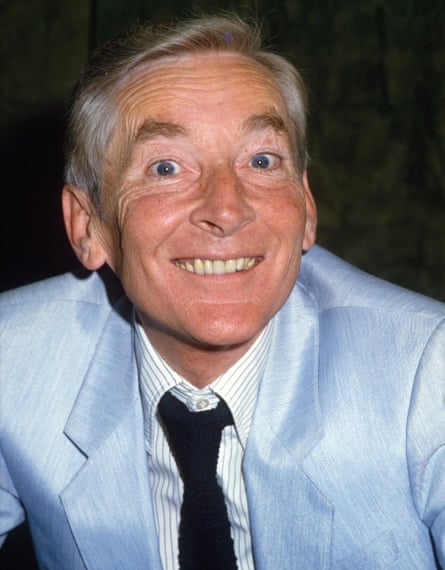
43. Parkinson’s successor was Sue Lawley, who came aboard in the spring of 1988. She had herself been a castaway in November 1987. Her luxury item was an ironing board.
44. Lawley’s first guest, on 27 March 1988, was Lord Hailsham. She seems to have a sense that she is in for the duration as she unveils her “very first castaway”. She was to do the job for 18 years.
45. One of her first encounters, on 10 April 1988, was with miners’ leader Arthur Scargill, whom she describes as “someone many people might like to see on a desert island”. It is a terrific interview, a world away from the gentle Plomley. Scargill chooses Edith Piaf’s Je Ne Regrette Rien. It is played immediately after he says he would change nothing in his handling of the miners’ strike of 1984-85. To reinforce the point, he chooses her singing in English.
46. In July of that year, Lawley interviewed Dame Edna Everage – one of three appearances by Barry Humphries. Dame Edna insisted on taking her bridesmaid Madge Allsop as her luxury. “I reminded her that the luxury had to be an inanimate object,” Lawley later explained. “She assured me that Madge was exactly that. So I allowed it.”
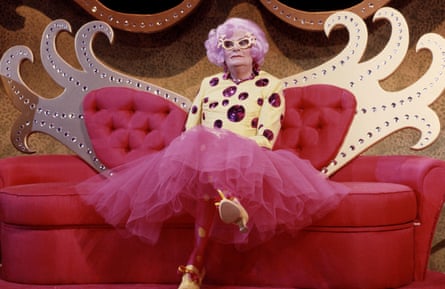
47. In October 1988, Lawley interviewed Germaine Greer. “Any sensible woman would be a lesbian,” says Greer. “Women are so easy to love. The only people who find them difficult to love are men. I really envy lesbians, but I’m afraid I can’t get it together.” Her frankness caused a frisson of media excitement.
48. A month later – this had been a tremendously strong start by Lawley – the castaway was Stephen Fry, the first of two appearances (so far). His luxury was a suicide pill. “I know that sounds terrible,” he says, “but it’s a very optimistic thing to want to take because the fact that I couldn’t be on my own shows I am reasonably happy with other people.”
49. In February 1989 Lawley interviewed Enoch Powell. Four of his musical choices are from Wagner’s Ring Cycle; three by Beethoven; his book is the Bible – the Old Testament in Hebrew, the New Testament in Greek. Powell’s island is not going to be a barrel of laughs. In an intense exchange, he argues that his “Rivers of Blood” speech in 1968 expressed Conservative party policy, denies he is a racist but predicts mass immigration will lead to civil war.
50. The most controversial guest ever, cast away in November 1989 when she was almost 80, was Lady Mosley – Diana Mitford before she married Sir Oswald Mosley, leader of the British Union of Fascists. Lawley asks her what she felt when she met Hitler. “Of course at that moment he was the person who was making the news, and therefore extremely interesting to talk to,” she replies. “He had extraordinary, mesmeric eyes, and had so much to say. He was so interesting, fascinating.” And the six million Jews murdered by the Nazis? “Oh, I don’t think it was that many,” says Mosley.
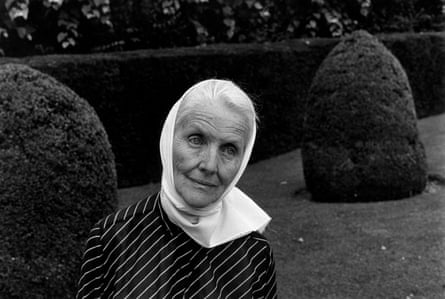
51. The castaway on 16 June 1991 was Booker prize-winning novelist AS Byatt. It was another remarkable interview in which Byatt talks both about her troubled relationship with her sister, Margaret Drabble, and about the death in a road accident of her 11-year-old son. “You don’t get over it,” she says, “and you suffer greatly from people supposing you will. Most days I think about him.”
52. The 50th anniversary guest on 26 January 1992 was the prime minister, John Major. He chose a full-scale model of the Oval cricket ground as his luxury item.
53. Bob Geldof was the castaway in September 1992, and asked for New York’s Metropolitan Museum of Art as his luxury. Lawley disallowed this, so he opted for a packet of condoms instead, which he said “represents hope over any possibility of salvation”.
54. The castaway on 24 October 1993 was DJ Kenny Everett, who a few months previously had revealed he was HIV positive – he was to die of Aids less than two years later. “I’ve got this theory that we’re in an endless loop of lives and it just never ends,” he says. “Every now and then I think about the absolute end of everything, and that gets me for about a second. And then I say ‘Stop it! Think about something jolly.’ There’s no point in ponderising [sic]. I could get run over by a truck tomorrow. So could you, Sue.”
55. In March 1996 Lawley interviewed shadow chancellor Gordon Brown. Lawley, who never shied away from the difficult questions, asked the then unmarried Brown whether he was gay. He did not storm out of the studio. “I’m not married because I’m not married,” he explained. “It just hasn’t happened yet.”
56. On 24 November 1996, Lawley also interviewed Tony Blair, leader of the opposition and soon to be prime minister. He insisted he wasn’t a “political obsessive”, chose a careful balance of pop and posh discs, and opted for a guitar as his luxury.
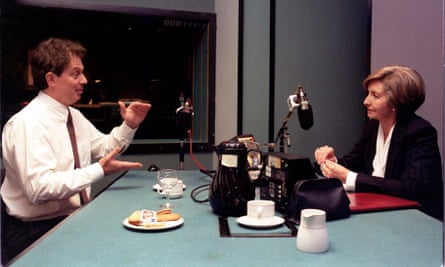
57. It is frequently claimed that Brigitte Bardot caused consternation when she asked for “a penis” as her luxury item, only for it to become quickly apparent that she was asking for “happiness”. It’s a lovely story – and completely apocryphal. La Bardot has never been on the programme. The closest we have is artist Cornelia Parker’s choice, in February 2003, of a “solar-powered vibrator”. “Not that I’ve ever used one,” she says, “but I’d love to have the chance.”
58. The following week – presumably there was no connection with the solar-powered vibrator – the castaway was George Clooney. He burnished his cultural credentials by choosing War and Peace as his book, but spoiled the effect by saying the huge number of pages would make it useful as toilet paper.
59. Lawley’s final interview was with actor Joan Plowright on 27 August 2006. As when Parkinson left, there was no formal leave-taking. Presenters were dispensable was the subliminal message. The show had to go on. Fade to By the Sleepy Lagoon.
60. The fourth presenter was Kirsty Young, blessed with a warm voice and a sharp sense of humour. Her first interview, on 1 October 2006, was with the illustrator Quentin Blake, a rather soft beginning.
61. Young had a scoop in June 2007 when Yoko Ono revealed she and John Lennon had discussed aborting their son Sean, and that she would have done so if Lennon had wished it. “I didn’t want to burden him with something he didn’t want,” she said.
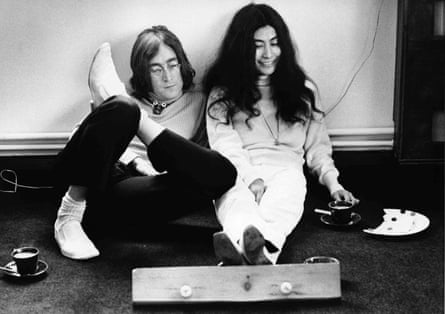
62. George Michael’s death this past Christmas Day was accompanied by clips from his memorable Desert Island Discs interview in September 2007 – how often this archive provides a significant memorial. Michael was ready to talk truthfully about his life – the public successes and private traumas – and Young didn’t need to do much more than prompt and pace him. He is likable, funny, clever, highly articulate, painfully honest: he explains how difficult it was to be a young gay man in the 1980s living in the shadow of Aids, and talks movingly of his first love, Anselmo Feleppa, who died from the disease in 1993. He chooses Amy Winehouse’s Love is a Losing Game as his favourite disc – prophetically wondering if she might succumb to unnamed demons – and an Aston Martin DB9 as his luxury.
63. The castaway on 24 February 2008 was David Dimbleby, who, when asked what luxury he wanted, replied: “I’ll take you.” “I nearly fell off my bloody seat!” Young said later. She rejected the idea, so he took pencils and drawing books instead.
64. Sex rears its head these days in a way it never did under Plomley. In September 2008 Kirsty Young asked Miriam Margolyes when she had first come to terms with her lesbianism. Margolyes explained it was in her mid-20s when she had an affair with a woman. She told her mother, who promptly had a stroke. “I realised that telling people things they can’t deal with is an indulgence,” says Margolyes sorrowfully. Her mother never really recovered. “It caused her a pain she could not bear.”

65. Writer and comedian David Walliams was cast away in February 2009, and proved an intense guest, talking about depression, his fear of being alone and, yes, his sexuality. “Sometimes I think it would be simpler if I was [gay] because everyone thinks I am,” he says.
66. The show made headlines again in November 2009 when Young interviewed singer Morrissey. His admission that he had contemplated suicide and his description of “self-destruction” as “honourable” produced complaints from families of people who had killed themselves.
67. Footballer Tony Adams also gave a very honest account of his battle with alcoholism in June 2010. He used to get so drunk he would wet the bed, but his mother never said a word. She would just hang the mattress out of the window to dry. The music is good as well, except for the Arsenal 1971 squad singing Good Old Arsenal.
68. The interview with actor and director Kathy Burke in August 2010 was one of the best received ever: funny, open and with fantastic choices – Sinatra, Lady Gaga, the Sex Pistols, T Rex, the Specials. She also chose a memorable luxury – “a lifesize laminated photograph of James Caan from Dragons’ Den to bodysurf on”.
69. The poet Ian McMillan, the “Bard of Barnsley”, was cast away in November 2010. He had the inspired idea of taking John Cage’s 4’ 33’ – four minutes and 33 seconds of silence – as one of his discs, believing it would encourage him to listen. They actually played about 20 seconds of it, during which time you could hear background giggles and McMillan’s stomach rumbling.
70. One of Young’s personal favourites is her interview, in January 2011, with Coronation Street’s legendary supplier of Lancashire hotpots, Betty Driver. “She was a brilliant storyteller,” said Young, “a real pleasure to spend time with.”
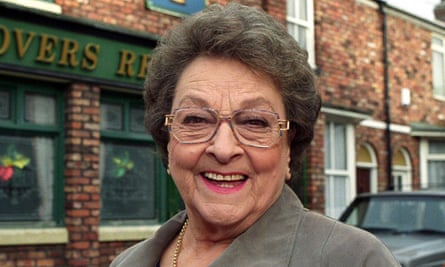
71. Terry Wogan made three appearances, the last on 1 January 2012 (the others were in 1983 and 1988). Young introduced him as “the man who put the wit in wittering” – she meant it as a compliment. “I had Plomley, and then Sue Lawley, and then the wee Scots girl,” he said later. “If anybody’s going to worm your more intimate secrets out of you, then Kirsty is the girl.”
72. The 70th-anniversary guest on 29 January 2012 was David Attenborough – he had also been on in 1957, 1979 and 1998 (his actor brother Richard also appeared twice). Who on Earth will be cast away for Desert Island Discs’ centenary?
73. The interview with artist and director Steve McQueen in September 2014 is one of Young’s very best. He is articulate, intense, genuinely trying to explain what motivates him as an artist. His account of how he overcame dyslexia and his school’s low expectations is powerful and moving. “Art,” he says, “was my salvation.”

74. The castaway on 14 November 2014, for the 3,000th edition, was Captain Eric “Winkle” Brown, the Fleet Air Arm’s most decorated pilot. He was 95 at the time, and announced he had just bought a new sports car. A wonderful, life-affirming interview with one of Britain’s greatest war heroes. Brown, who died in February 2016, chose as his luxury his 12 flight log books, charting his extraordinary flying career.
75. Mick Jagger is one of the famous Desert Island Discs refuseniks – George Bernard Shaw, Laurence Olivier, Ted Hughes and Prince Charles turned it down too. But in October 2015 fellow Stone Keith Richards agreed to be marooned. He was a fantastic interviewee with a marvellously smoky voice and, naturally, a great choice of music. Whether he could survive on the island without falling out of a tree is another matter.
There is a comprehensive Desert Island Discs archive at bbc.co.uk.
Who has been your most memorable castaway? Share your favourites below.
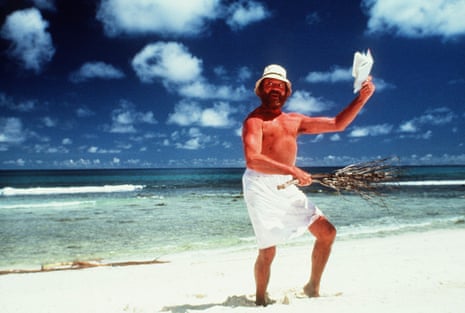

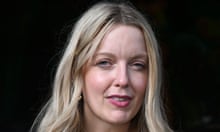


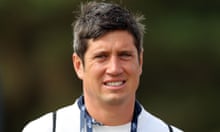
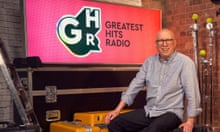


Comments (…)
Sign in or create your Guardian account to join the discussion